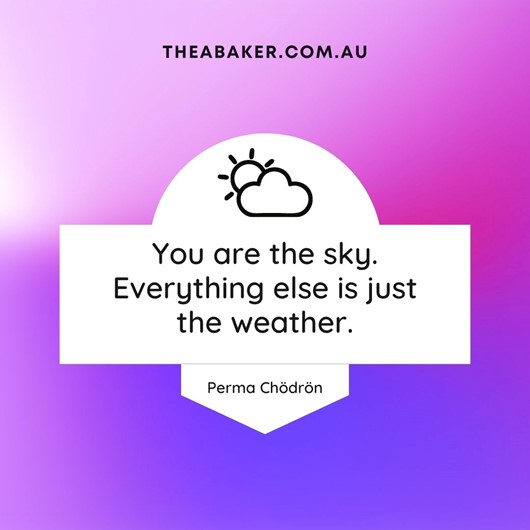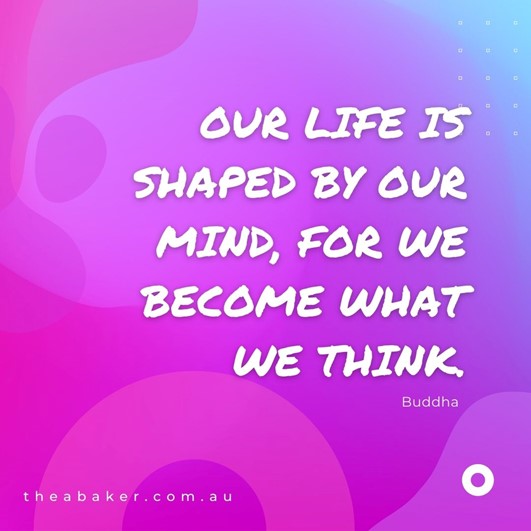Mindful May
Mindful May
I think that mindfulness sometimes gets a bit of a bad wrap and because I was looking for a little bit of alliteration-based inspiration this week, at the start of the new month of May, I thought I’d spend some time looking at all things ‘mindful’.
What is mindfulness?
According to Smiling Mind mindfulness is “paying attention to the present moment with openness, curiosity and without judgement”. It encompasses two main factors:
- Awareness – the knowledge and ability to focus attention on our inner processes and experiences such as being present in the current moment.
- Acceptance – the ability to observe and accept (rather than judge or avoid) those streams of thought.
To be mindful is to observe, to just notice, the thoughts, feelings and bodily sensations in an objective and non-judgemental way. In this way, mindfulness can be a mechanism to help us become less self-critical and provides us with the space to manage unpleasant or overwhelming emotions.
There are three key elements of mindfulness:
- Paying attention on purpose (having deliberate awareness)
- Being non-judgemental (things are neither good nor bad, they just ‘are’)
- Being non-reactive (expanding the capacity to sit with our thoughts, impulses, emotions, feelings without acting
History of mindfulness:
Mindfulness has its roots in Buddhist and Hindu teachings. The emergence of mindfulness into western culture is often attributed to Jon Kabat-Zinn who studied mindfulness under several Buddhist teachers including Thich Nhat Hanh. In the 1970’s Kabat-Zinn developed a pivotal program called Mindfulness-Based Stress Reduction (MBSR) to help treat chronic pain. Since then, extensive empirical research has seen mindfulness be incorporated into a range of cognitive behavioural therapies – Mindfulness-Based Cognitive Therapy (MBCT), Dialectical Behaviour Therapy (DBT) and Acceptance and Commitment Therapy (ACT).
Mindfulness can:
- Help reduce worry, anxiety and distress
- Create a sense of calm
- Help us learn how to relax and regulate emotions
- Improve concentration and increase productivity
- Develop a sense of empathy and connectedness to others
- Enjoy better health, wellbeing and sleep behaviours
Practicing mindfulness:
Our human experience tends to be super subjective and heavily influenced by our emotional state. This means that sometimes bad days, bad experiences, fears and insecurities about the past and future can make it really difficult to appreciate or enjoy what we have in the happening in the present. Mindfulness is not something revolutionary – we all have the ability to be present, aware of where we are, what we are doing, feeling, and thinking and not being overly reactive or emotionally overwhelmed by what is going on around us.
Whenever we bring our awareness to what we’re directly experiencing via all our senses, or to the thoughts going through our minds and emotions we are being mindful. There’s a range of formal and non-formal approaches to being more mindful. Formal approaches, or deliberately attempts to cultivate mindfulness often looks like an intentional mediation practice. Informal approaches to expanding our mindfulness might be simply spending time regularly tuning into our bodily sensations, our breath, emotions and thoughts, without judgement or reaction.
Mindfulness techniques:
- Basic mindfulness meditation– Sit quietly and focus on your natural breathing or on a word or “mantra” that you repeat silently. Allow thoughts to come and go without judgment and return to your focus on breath or mantra.
- Body sensations– Notice subtle body sensations such as an itch or tingling without judgment and let them pass. Notice each part of your body in succession from head to toe.
- Sensory– Notice sights, sounds, smells, tastes, and touches. Name them “sight,” “sound,” “smell,” “taste,” or “touch” without judgment and let them go.
- Emotions– Allow emotions to be present without judgment. Practice a steady and relaxed naming of emotions: “joy,” “anger,” “frustration.” Accept the presence of the emotions without judgment and let them go.
- Urge surfing– Cope with cravings (for addictive substances or behaviours) and allow them to pass. Notice how your body feels as the craving enters. Replace the wish for the craving to go away with the certain knowledge that it will subside.
If this blog has brought up something in your life that you’d like the space to explore, we have a team of trauma-informed therapists at Thea Baker Wellbeing and we have IMMEDIATE availability – please reach out to us at: hello@theabaker.com.au / 03 9077 8194.


